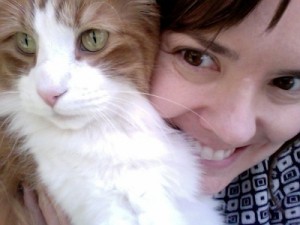
So this post involves traveling of a different sort. Barbara Duffey invited me to hop aboard the round robin blog tour, which zips from blog to blog, nudging writers to talk about their work.
Barbara is the author of a full-length book of poems, I Might Be Mistaken (Word Poetry, 2015) and two chapbooks of poetry, The Circus of Forgetting (dancing girl press) and The Verge of Thirst (part of the Four Quarters to a Section chapbook contest). She’s a marathoner, a Girl Scout, and an assistant professor at Dakota Wesleyan University.
OK, and now I get to talk about myself (Barbara said to).
1. What are you working on?
The project I like to talk about the most is a spiritual autobiography viewed through the lens of fashion. What we wear reveals important details about who we are and who we aspire to be. My journey from a fundamentalist Baptist upbringing in West Virginia to a liturgically minded, crunchy Episcopalian in the Pacific Northwest is better shown with specifics. I need my high school wardrobe of baggy XL t-shirts printed with Bible verses, and my current wool cassock and billowy surplice for the cathedral choir, to really talk about my spiritual life. I’d like for these short nonfiction pieces to be interchangeable, so the manuscript would be like a prose closet.
I’m trying to get my podcast ambitions back on track. I’ve started a web site, Rambunctious Vernacular, that so far has four episodes of my podcast series, a mix of interviews and recordings of writers reading their work. I get really excited about the possibilities of audio storytelling, how it’s easier to ask someone to listen to something than to read it (and even easier to ask them to watch something, but I’m not ready to launch into video production).
I’m also editing a forthcoming online creative nonfiction anthology called How To Pack For Church Camp. I’m fascinated by summer camp narratives, the epiphanies we have while canoeing or making boondoggle keychains. As I like to say, my experiences with church camp combined the scatological and the eschatological in memorable ways.
2. How does your work differ from others of its genre?
I’ve been told that I write nonfiction like a fiction writer, and I like the sound of that. In the English department where I work, I’m surrounded by many poets (really, I am living the dream). Around them, I feel avant-guard because my work touches the right margin of the page.
I call what I do “spiritual writing,” which can sound new-agey to some and ring alarm bells of Sunday School leaflets to others. I also fancy myself something of an easily distracted fashion blogger. These two subgenres of creative nonfiction don’t cross paths all that much, and it’s a space I want to explore.
3. Why do you write what you do?
Sometimes with essays, I write when a big thing happens to me and I need to make meaning out of it. Like a few years ago, I passed my PhD qualifying exams and got dumped and then went to Burning Man with one of my best friends, in hopes of experiencing, I don’t know, healing or adventure or a sign that things would be OK. It was such a surreal and exhausting experience that I had to write about it as soon as I got back to the Default World.
While writing, I’ll oftentimes have a hunch that things go together, and so I follow that. In the last few months, I’ve gotten married, lost my grandmother, and had a miscarriage. On my last walkthrough of Nana’s house, I looked in one of her nightstands and found book called A Marriage Manual from 1953. No one gave me a marriage manual, I thought. I’ve been thinking about why this was in her nightstand, so many years after my grandfather died. The essay form is hospitable to surprising juxtapositions, so I’m working on combining some of the text of this marriage manual with a reflection on what it means that these big life events happened in such a short time.
4. How does your writing process work?
I’m better at cutting than adding. I write a bunch, freestyle, and then go back a bit later to figure out what I’m up to. Kevin, one of my former teachers, once accused me of using the Garbage Bag method of composition (as in, if you write enough to fill a garbage bag, there’s probably an essay in there somewhere). I haven’t outgrown this system quite yet.
Next up, you’ll hear from three wonderful bloggers, who’ll post their answers by May 15. The round robin blog tour continues!
Katie Daroff currently lives in northern Utah with her family while getting ready to go away to Kingston Upon Thames in England for an MA Program in Creative Writing. She graduated from Whitworth University in May of 2012 with a BA in English/Creative Writing. Since then she has worked odd jobs as a grant writer, the caregiver for an elderly man, and a receptionist for a counseling office. Katie blogs at Hot, Strong, and Totally Steamed.
Angie Hilbert describes herself as “a fire sheep and a Scorpio. My Dharma name is Karma Chang Cholb Drolma but you can call me ‘Angie.’ I am a travel blogger with the Wanderlust and Lipstick. My blog, WanderLit, covers contemporary world literature, travel writing, keeping a travel journal, and literary destinations. I make my nest in Ohio but if I look like I’m a million miles away, I probably am.”
Cara Strickland is a writer and anxious cook living in Washington State. She writes about faith, life, food and relationships on her blog Little Did She Know and elsewhere.